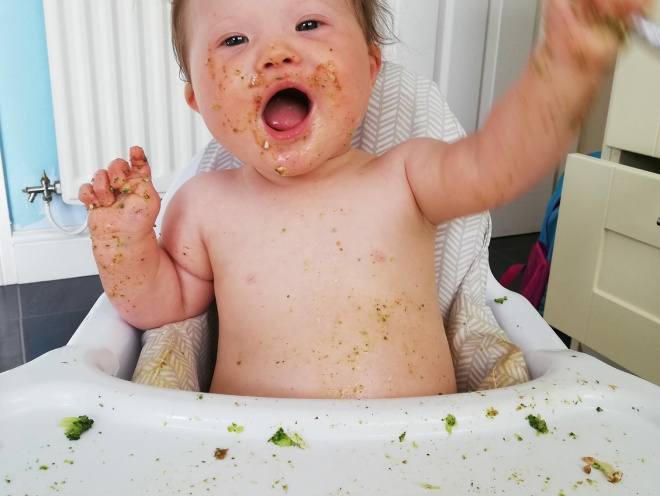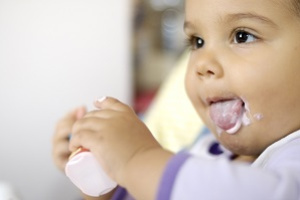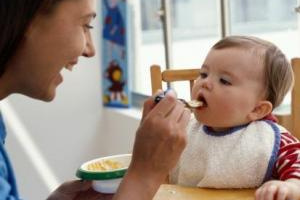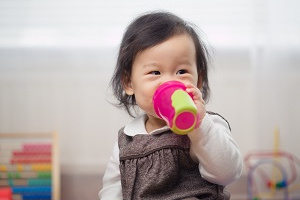Baby-led weaning means your little one decides which foods they pick up and feed themself. Here are 10 tips to help you start with baby-led weaning.
You can look forward to seeing some priceless expressions as your baby tries their first foods.
It can be great fun for your little one to explore new flavours and textures. Baby-led weaning can also help babies to learn and develop. Babies learn to associate the look, colour, feel and taste of food when they handle it, and it helps them to develop their co-ordination.
Here's how to get started...
1. Best age to start
The current advice is to introduce your baby to solids from six months old. At six months, most babies will be ready to try their first foods. They should also have the hand–eye coordination they’ll need to be able to pick up food and feed themselves (NHS, 2019).
For more information on how to know when your baby is ready for solids, see our article Introducing your baby to solids.
2. Get your baby comfy
Sit your baby upright facing the table, either on your lap or in a highchair. Make sure they are comfortable, steady and can use their hands and arms freely. It’s important they are sitting upright and not distracted when eating, to help prevent choking (Rapley and Murkett, 2010).
3. Be prepared
It won’t take long for your baby to learn to squash, drop and fling food. So it’s a good idea to have a high chair you can easily wipe down. Some parents put food straight onto their baby’s high chair tray instead of using plates and bowls.
You might also like to get a baby splash mat or floor mat. You could even find an old shower curtain that you can put down under the table. These can collect stray food, help protect your carpet and are easy to wipe down.
4. First foods
Cooked sticks or pieces of vegetables that are soft but firm enough for babies to hold usually go down well. One of the beauties of baby-led weaning is that your little one gets to explore a variety of types and textures of food straight away.
5. Baby’s in control
Baby-led weaning puts your little one in control – only they get to put food in their mouth. You decide which foods to offer your baby but they decide how much of it to eat (or not). So remember to offer food to your baby and let them choose what to pick up and take.
Try to avoid putting food into their mouth or persuading them to eat more than they want. Let them put food in their mouth themselves, so they can learn how to move it back out of their mouth, too.
6. Finger food for beginners
Thick sticks or long strips work well at first. Pieces should be twice the length of your baby’s hand. This enables them to grasp sticks of food with their whole fist, with no risk of them trying to swallow it whole.
Your baby might enjoy chewing large pieces of pasta, fingers of toast and well-cooked meat or fish.
You can get a bit creative if you like and use a crinkle cutter to help your little one get some extra grip on their stick-shaped finger foods (First Steps Nutrition Trust, 2020).
Babies can chew very well with their gums so there’s no need to wait for that first tooth to arrive. To begin with, they might not swallow much of the food because their tongue strength is still limited. But in time they will get better at it.
7. Family mealtimes
Include your baby in your meals whenever you can. If your family dishes are suitable, you can offer them the same food as the rest of the family. If you are planning to add extra salt or sugar you can serve out a portion for your little one before adding them (NHS, 2018).
Family meals are a chance to socialise too. Your baby will love to interact with family members and copy them eating. Even if it’s just you and your little one, you can keep it social by smiling, paying attention and chatting to them.
8. Timing is everything
Choose times when your baby is not tired or hungry, so they can concentrate. Mealtimes at this stage are for play and learning. So don’t hurry your baby or distract them. Let them take their time.
Initially, milk will still be their main source of food. So don’t worry too much about how many times a day or how much your little one is trying solids (NHS, 2019).
9. Milk feeds
Carry on offering breastmilk or formula feeds as before. Milk is still your baby’s main source of nutrition until they are one year old. When your baby needs less milk, they will reduce the amount of milk they drink themselves (NHS, 2019).
10. Thirsty work
It’s a good idea to encourage your baby to drink water out of a cup from six months old. Offering your baby water to drink with their meals will help get them into good habits and keep them hydrated (NHS, 2019).
This page was last reviewed in February 2022.
Further information
Our support line offers practical and emotional support with feeding your baby and general enquiries for parents, members and volunteers: 0300 330 0700.
You might find attending one of our Early Days groups helpful as they give you the opportunity to explore different approaches to important parenting issues with a qualified group leader and other new parents in your area.
Make friends with other parents-to-be and new parents in your local area for support and friendship by seeing what NCT activities are happening nearby.
First Steps Nutrition Trust. (2017) Eating well: the first year. Available at: https://www.firststepsnutrition.org/eating-well-infants-new-mums [Accessed 10th February 2022]
NHS. (2018) Foods to avoid giving your baby. Available at: http://www.nhs.uk/Conditions/pregnancy-and-baby/Pages/foods-to-avoid-baby.aspx [Accessed 10th February 2022]
NHS. (2019) Your baby’s first solid foods. Available at: http://www.nhs.uk/Conditions/pregnancy-and-baby/Pages/solid-foods-weaning.aspx [Accessed 10th February 2022]
Rapley G, Murkett T. (2010) Baby-led Weaning: The Essential Guide to Introducing Solid Foods and Helping your Baby to Grow up a Happy and Confident Eater. Experiment LLC, London.








